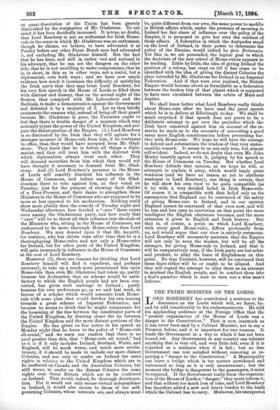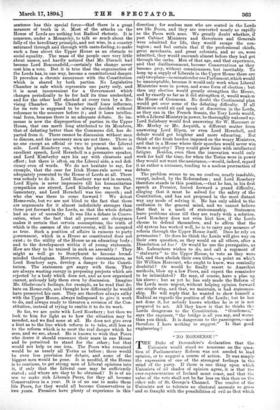THE PRIME MINISTER ON THE LORDS. T4 ORD ROSEBERY has contributed
a sentence to the discussion on the Lords which will, we fancy, by- and- by add considerably to his embarrassments. He told his applauding audience at the Foreign Office that the " present organisation of the House of Lords was a danger to the Constitution." That is new, inasmuch as it has never been said by a Cabinet Minister, not to say a Premier, before, and it is important for two reasons. It binds the Government in a way in which it has not been bound yet. Any Government in any country can tolerate anything that is very old, and very little felt, even if it is regarded as a nuisance when it is felt ; but no free Government can rest satisfied without removing or re- pairing a "danger to the Constitution." A Municipality can leave a bridge which is too narrow unwidened and untouched so long as it is only inconvenient; but the moment the bridge is dangerous to the passengers, it must be repaired. If 1 he Government really deem the organisa- tion of the House of Lords a " danger," they must reform it, and that without too much loss of time, and Lord Rosebery has therefore added a new and heavy burden to the loads which the Cabinet has to carry. Moreover, his unexpected sentence , has this special force—that there is a great measure of truth in it. Most of the attacks on the House of Lords are nothing but Radical rhetoric. It is nonsense, under a Monarchy, to talk so much about the folly of the hereditary principle, and not wise, in a country saturated through and through with caste-feeling, to make such a fuss about the Upper House as an obstacle to social equality. The mass of the people care very little about names, and hardly noticed that Mr. Disraeli had become Lord Beaconsfield,—certainly the change never cost him a vote. But it is true that the organisation of the Lords has, in one way, become a constitutional danger. It provokes a chronic annoyance with the Constitution which is shared by both parties. No Legislative Chamber is safe which represents one party only, and it is most inconvenient for a G-dvernment which changes periodically to be for half its time unchecked, and for the other half checked at every turn by a Re- vising Chamber. The Chamber itself loses influence, for its vote is supposed to be always decided without reference to the measure before it ; and it loses intellec- tual force, because there is no adequate debate. So im- mense is now the disproportion of parties in the Upper House, that one merit long attributed to its Members, that of debating better than the Commons did, has de- parted from it. There cannot be discussion without men to discuss, and the necessary men are not there. There is no one except an official or two to present the Liberal side. Lord Rosebery can, when he pleases, make an excellent speech, Lord Herschell is a persuasive speaker, and Lord Kimberley says his say with clearness and effect ; but there is often, on the Liberal side, a sad defi- ciency even of words. We do not hesitate to say, for example, that the case for Irish Home-rule never was adequately presented to the House of Lords at all. There was nobody to do it. Lord. Rosebery was not in earnest, Lord Ripon is never impressive till his humanitarian sympathies are stirred, Lord Kimberley was too Par- liamentary, and Lord Herschel' was too smooth ; and who else was there to come forward ? We detest Home-rule, but we are not blind. to the fact that there are arguments for it almost indefinitely stronger than those put forward in the Lords, so that the whole debate had an air of unreality. It was like a debate in Convo- cation, when the fact that all present are clergymen makes it certain that certain assumptions, the truth of which is the essence of the controversy, will be accepted as true. Such a position of affairs is ruinous to party government, which in a House so constituted does not exist ; to the utility of the House as an educating body ; and to the development within it of young statesmen. How are they to be trained in such an assembly ? They might as well go to Stonyhurst to become broad- minded theologians. Moreover, these circumstances, as Lord Rosebery says, develop a danger to the Consti- tution. The statesmen get angry with them. They are always wasting energy in proposing projects which are rejected by a body which does not, and as now organised cannot, seriously help them even by discussion. Imagine Mr. Gladstone's feelings, for example, as he read that de- bate on Home-rule, and thought how differently he would have presented his case. They are therefore always sulky with the Upper House, always indisposed to give it work to do, and always ready to threaten a revision of the Con- stitution, instead. of trying to enable it to do its work.
So far, we are, quite with Lord Rosebery ; but then we look to him for light as to how the situation may be mended, and we find none at all. He does not give even a hint as to the line which reform is to take, still less as to the reform which is to meet the real danger which he sees, and we see, ahead. He is known to wish that Peers who desire it should renounce their seats in one House and be permitted to stand for the other; but that would not help us one iota. The Peers who remained. would. be as nearly all Tories as before ; there would be even less provision for debate, and some of the biggest men would be gone. It is needful, if the House is to continue, to get strong men of Liberal opinions into it, if only that the Liberal case may be sufficiently stated ; and where are they to be obtained ? It is of no use to make rich Liberals Peers, for they all become Conservatives in a year. It is of no use to make them life Peers, for they would all become Conservatives in two years. Premiers have plenty of experience in this direction ; for sonless men who are seated in the Lords are life Peers, and they are converted nearly as rapidly as the Peers with sons. We greatly doubt whether, if past Cabinet Ministers and Governors and Generals were admitted for life, they would escape the con- tagion; and feel certain that if the professional chiefs, great merchants, and great colonists, and so on, were admitted, they would succumb almost before they had got through the oaths. Mei of that age, and that experience, and that disillusionment, become Conservatives as they become grey, without consciousness, but inevitably. To keep up a supply of Liberals in the Upper House there are only two plans—nomination for one Parliament,which would be unacceptable, because it would only work when Liberal Ministries were in power, and some form of election • but then any election would greatly strengthen the House, and by exactly so far as it did. strengthen it, would weaken the House of Commons. No doubt the Continental plan would get over some of the debating difficulty. If all Ministers could sit and speak at discretion in the Lords, as they can in the French Senate, the Tory Lords would, with a, Liberal Ministry in power, be thoroughly wakened up. Lord Salisbury would find answering Sir W. Harcourt or Mr. Morley or Mr. Asquith, a different matter from answering Lord Ripon, or even Lord Herschel', and debate would get brighter and more educating. But think of the fresh burden imposed on the weary Ministers, and that in a House where their speeches would never win them a majority ! They would grow faint with intellectual fatigue. Besides, even then the innovation would. only work for half the time, for when the Tories were in power they would not want the assistance,—would, indeed, regard it as rather a nuisance, tending to a useless protraction of debate.
The problem seems to us, we confess, nearly insoluble, except, indeed, by the Referendum ; and Lord Rosebery therefore stands in this position,—that he has, in his first speech as Premier, forced forward a grand difficulty, alleging that it must be solved for the safety of the Constitution, and has not proposed in the most distant way any mode of solving it. He has only added to the confusion in the general mind, and we cannot believe that that is a mark of statesmanship. Statesmen leave problems alone till they are ready with a solution. Lord. Rosebery does not even hint how, if the Lords choose to defend themselves, and to affirm that the old system has worked well, be is to carry any measure of reform through the Upper House itself. Does he rely on persuasion ? Or does he think the Lords will give way on their own question, as they would on all others, after a Dissolution ad hoc ? Or would he use the prerogative, as Mr. Labouchere wishes to do, and call a regiment of " stalwarts " to the Upper House, to vote as they were bid, and then abolish their own titles,—a point on which Sir William Harcourt, who ought to know, was comically doubtful ? Or would he finally resort to Anarchist methods, blow up a few Peers, and expect the remainder to be intimidated? He may, of course, have a plan up his sleeve ; but as yet he has only made the Reform of the Lords more urgent, without helping opinion forward one single step, and that, we maintain, is bad statesman- ship. He will reply that he wanted to show himself a Radical as regards the position of the Lords ; but he has not done it, for nobody knows whether he is or is not prepared to act. All they know is that he thinks thi Lords dangerous to the Constitution. " Gentlemen," says the engineer, " the bridge is all you say, and worse than you think. It is dangerous to the passengers,—and therefore I have nothing to suggest." Is that good engineering ?



































 Previous page
Previous page